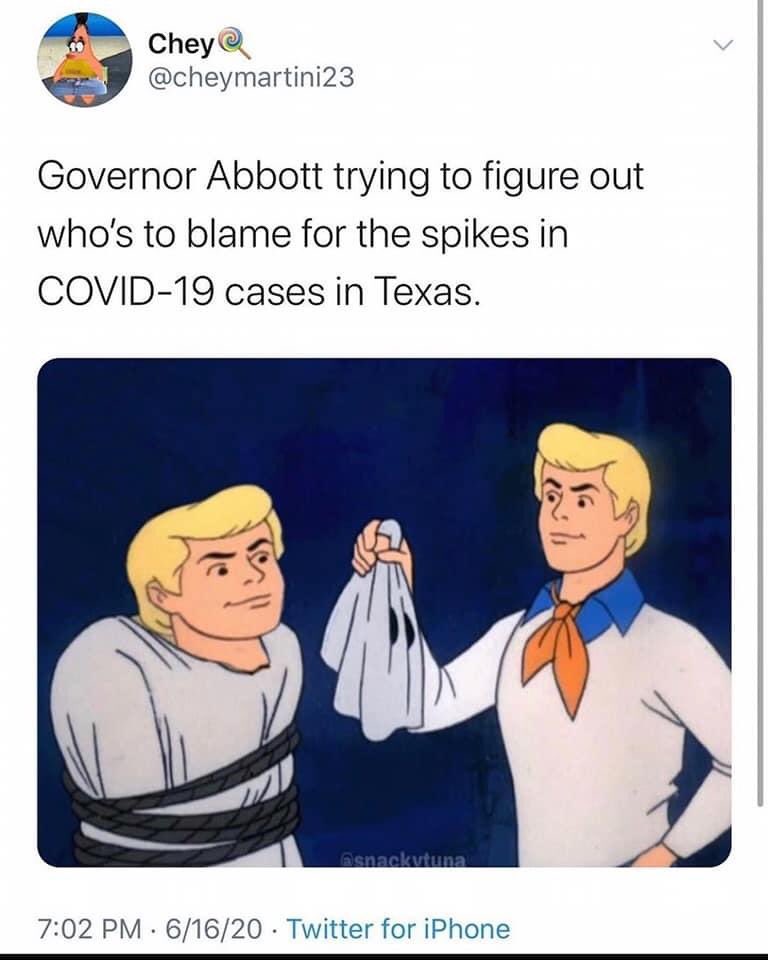Happy COVID Disaster Declaration Thousand-Day Anniversary to all who celebrate.
Thursday marks 1,000 days that Texans have been living under Gov. Greg Abbott’s public health disaster proclamation — an era of unprecedented gubernatorial authority for the state’s chief executive, triggered by the March 2020 scramble to contain the COVID-19 pandemic that continues to kill Texans every day.
The entire nation remains under a federal public health emergency at least through the winter season, which experts say could bring another wave of infections as families gather indoors for the holidays, immunity dips or virus variants sidestep older vaccines.
But after more than 92,000 deaths and 8 million confirmed COVID-19 cases in Texas in the 32 months since the declaration was made, the state remains one of less than a dozen still under a statewide declared disaster or public health emergency.
The proclamations give executive branches more power to quickly respond to disaster situations that are too urgent to wait for the usual bureaucratic wheels to grind into action.
In Texas, the disaster declaration gives Abbott’s executive orders — normally nonbinding — the weight of law.
Using them, he has the ability to suspend any regulatory statute or state agency rule without legislative approval, transfer money between agencies without legislative oversight, commandeer private property and use state and local government resources, evacuate populations and restrict the movement of the people, among other things.
[…]
The declaration was first made on March 13, 2020, and has been renewed 32 times since.
“Declaring a state of disaster will facilitate and expedite the use and deployment of resources to enhance preparedness and response,” the proclamation read.
At the time, 80 Texans had confirmed or suspected cases of COVID-19. No deaths had been reported yet.
Under the public health disaster order, Abbott has made several unilateral decisions in response to the pandemic.
He extended the length of early voting in 2020 to help thin out Election Day crowds. He enacted mask mandates; directed state agencies to offer work-from-home options to employees; closed bars, gyms, nail salons and other businesses during one of the early surges; banned elective surgeries; limited long-term care visits; and capped venue occupancy until later removing those limits and banning cities from enacting them.
In his entire tenure as governor, Abbott has issued 42 executive orders. Most of them — 35 so far — are COVID-related and carry the weight of law. Only seven of them, none of which were binding, came in the four years before the pandemic hit.
His most enduring actions under the disaster declaration are a ban on cities and counties from enacting mask ordinances, vaccine mandates and occupancy restrictions — a provision that seems popular with most Texas Republican lawmakers and one of the main reasons Abbott’s office says he keeps renewing the disaster declaration.
There’s more so read the rest. As noted above, the main effect of this order has been to greatly increase Abbott’s executive powers, which he has used in part to wage his war on cities and Democratic counties. Some of those actions he has taken, specifically in regard to mask mandates, are still being litigated, with initial rulings going against Abbott but with the Supreme Court still to weigh in. Some of his actions have been helpful; the story cites an extension of emergency food assistance for needy families without additional oversight as an example. The Legislature could codify or rein in Abbott on any or all of these things, but they haven’t – you may recall the calls for a special session on various COVID-related topics that went unheeded – and they won’t. But I bet they would have if Beto had been elected Governor.
Abbott’s current COVID disaster declaration – we have to be specific here, as we are also under disaster declarations for the drought, the school shooting in Uvalde, the situation at the Texas-Mexico border and wildfires – ends on December 1, and it seems a likely bet that he will extend it again. He’s got a good thing going, no one will stop him, and yes, we may face another surge this winter for which such a declaration would be routine. It might even be a good idea in the hands of a better Governor. That’s not what we have here, but it’s probably going to be what we get.

